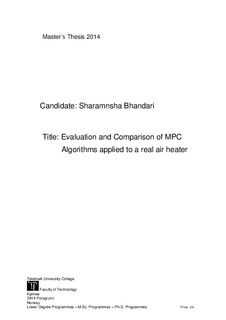| dc.description.abstract | With a remarkable increase in demand for safe, efficient and stable control operation, process control for process plants has become more important. Although Conventional PID controllers have been used in the process industries for the longest time, the need of advanced control strategies such as MPC has been felt in not only the process industries but also in many academic and research activities. This thesis tries to draw attention towards basic idea of MPC theory, the controller performance and its practical implementation in the real physical process. For the implementation purpose, Linear and non-Linear MPC has been developed in the simulated process using the process model before its implementation on a real physical process. The MPC control algorithm has been tested in the air heater system, where the objective is to keep the temperature of the air heater to the desired reference temperature. The two predictive control algorithms have been compared after applying controller to the process model/process in terms of relative stability margins (Phase Margin and Gain Margin), set point tracking (IAE criterion used as a measure), Horizon length and computational time. It is noticed that non-linear MPC is better than linear MPC in terms of IAE as the error computed in non-linear MPC is found to be less. In addition, it is observed that non-linear MPC requires shorter horizon length as compared to linear MPC to give equally good, if not better results. However, if same horizon length is used for both linear and non-linear MPC, linear MPC requires less computational time than that of non-linear MPC. Based on the results obtained, it is observed that neither of the predictive control algorithms is that robust against any model change, which is analyzed after calculating Phase Margin for the controllers. In addition, the concept of Gain Margin is not that clear in MPC as it is difficult to calculate Gain Margin, as the controller response is not subjected to the stability limit even with the increase in loop gain that is inserted between controller and the process. Kalman filter as the state estimator is used especially to estimate the ambient temperature, which cannot be measured directly. It makes sense to use kalman filter to estimate the states as the temperature at the surroundings influences the true air heater temperature. | |
